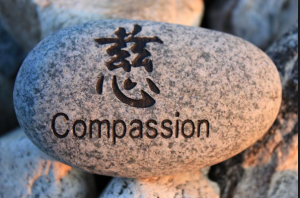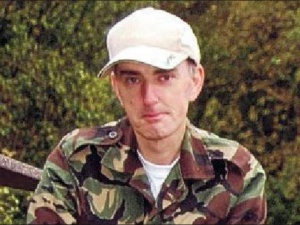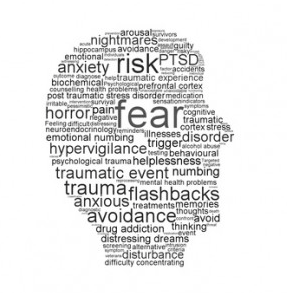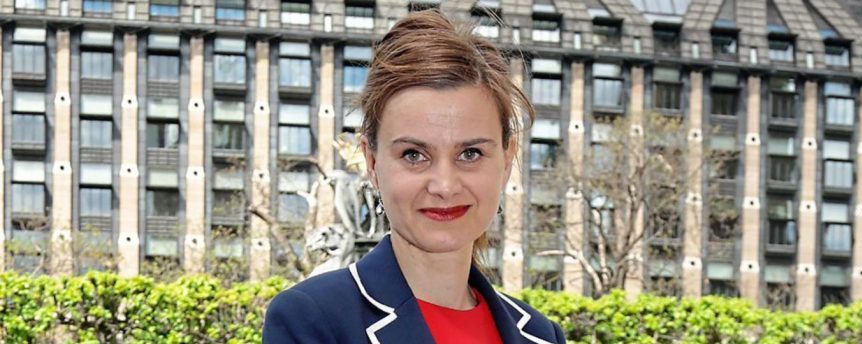The killing of MP Jo Cox has profoundly shocked the UK. The country has been plunged into mourning, heightened by the dedicated way she lived her values of compassion, humanitarianism, equality and public duty.
A number of deeply thoughtful articles appeared over the days after her death, situating this devastating tragedy within the dark political mood that has descended on Britain as a result of the divisive tone of the EU Referendum. Joan Smith said: “It should be blindingly obvious that an atmosphere rank with misanthropy, distrust and the worst kind of populism risks dehumanising decent people.” Jonathan Freedland put it this way: “If you inject enough poison into the political bloodstream, somebody will get sick.”
Jo Cox stood against division and poison. Her playful, cheeky style allowed her to fight determinedly for a fairer, more just and peaceful world.
Over the same few days, the media also brought us insights about the man arrested for her murder, Thomas Mair.
So here is the very difficult challenge that Jo Cox’s death presents us with. How do we extend the compassion for which we are esteeming her…to the man accused of killing her?
This is a profoundly uncomfortable question for most of us to contemplate. Some readers may feel that is demeaning to Jo Cox’s memory that it is even being asked. We are in shock from this utterly senseless loss. How can it be respectful to offer compassion to the man accused of killing her? Is he not, instead, deserving of condemnation?
 This is the dilemma that we face in celebrating Jo Cox’s life. The bitter backbone of a philosophy of compassion is that we do not get to offer it only to the people we like. This philosophy says it has to be offered to everyone, including people who commit actions we hate. I understand it can feel crazy to contemplate that a person who may have caused such needless grief — to two young children, a loving husband and a whole country – should be deserving of compassion. Yet that is what Jo Cox’s life calls us to consider.
This is the dilemma that we face in celebrating Jo Cox’s life. The bitter backbone of a philosophy of compassion is that we do not get to offer it only to the people we like. This philosophy says it has to be offered to everyone, including people who commit actions we hate. I understand it can feel crazy to contemplate that a person who may have caused such needless grief — to two young children, a loving husband and a whole country – should be deserving of compassion. Yet that is what Jo Cox’s life calls us to consider.
One of the reasons it is difficult to hear that people associated with hateful acts deserve compassion is that blame makes it easier for us to cope with our distress. It gives us somewhere to focus our grief and anger and loss. It makes us feel better to castigate and revile. Such sentiments make it feel like we have solved the problem. We know who to condemn.
Condemnation takes energy. The energy makes it feel like we have taken action. But our action hasn’t actually solved any problem. We have just made ourselves feel better.
When we turn to blame and shame and hate, we solve nothing. If we want to fight violence, we have to look beyond our immediate feelings of distress. Jo Cox knew that.
I am not negating what happened. I am not condoning violence. What I am saying is that it is in our gift to ourselves to choose whether we let another person’s actions drive us to more hatred. Adam Bienkov put the same sentiments this way, in his own piece this week: “We all have choices. Our politicians and our press…can choose to help the vulnerable, inform the public and calm fears. Or they can choose the opposite.”
 The only effective solution to violence lies in fighting disconnection. It has not yet been proven that Thomas Mair killed Jo Cox. That remains to be seen through a legal process. Many people have read information about him already in the press, though, and the summary of that content is that he is a man who has suffered disconnection in his life.
The only effective solution to violence lies in fighting disconnection. It has not yet been proven that Thomas Mair killed Jo Cox. That remains to be seen through a legal process. Many people have read information about him already in the press, though, and the summary of that content is that he is a man who has suffered disconnection in his life.
The press stories have documented a long history of mental health difficulties. One of the ways he is reported to have coped with with these was through volunteering. For some period of time, he even attended a day centre, from which he said he gained considerable support. He is described as having lived alone for the past 20 years, following the death of his grandmother, continuing to live in the house he had shared with her since he was a child. He has not, seemingly, had a partner for years, having once had a girlfriend, but, as his brother reported, “his mate took her off him and he said he didn’t want another one.” Some of his neighbours describe him as “a bit of a loner”, even though he regularly did the shopping for his mother. And it is striking that while few individuals interviewed have described him as unfriendly or violent, neither were any of them apparently ever invited into his house. Overall, a picture emerges of Thomas Mair living with a fair bit of disconnection and loss.
I know that some readers might end up thinking, if he were proved to have killed her, “Such things have happened to me and I haven’t resorted to violence. Plus, he’s had help with his mental health difficulties. So that’s no excuse.”
I am not trying to excuse violence. Compassion doesn’t mean excusing actions. It means not condemning the humanity of the person who committed them.
What I am trying to do is think about what causes violence. I am trying to be curious about what attracts any person to neo-Nazi political parties. I am trying to imagine what motivates any apparently mild-mannered person to extreme action. I am trying to ask myself what physiological state any person has to be in to decide to resort to violence. It is only curiosity about what causes hatred that gives us any chance of preventing it.
All the science that we have tells us that disconnection and trauma make people emotionally vulnerable. It undermines their ability to regulate their own behaviour. It makes them more subject to emotional swings and mental illness. It makes them less resilient. Emotional connection and resilience are essential for human well-being.
Whatever the court finds in regard to Thomas Mair’s guilt, it is sobering to realise that he has himself spoken to the theme of disconnection. In 2010, he was interviewed by his local paper and had this to say about why he volunteered:
“I can honestly say it has done me more good than all the psychotherapy and medication in the world. Many people who suffer from mental illness are socially isolated and disconnected from society. All these problems are alleviated by doing voluntary work.”
It sounds very promising. But 2010 is six years ago. That’s a long time in anyone’s life.
 Why am I reflecting on such details? They matter because our society does not take emotional suffering seriously enough. One in 10 children in the UK now have a diagnosable mental health problem. That’s not a hidden statistic. It was quoted in the press this week, in a story about parenting support. The Royal College of Nursing called this week for more attention to be given the “crisis” in children’s mental health. The Duke of Cambridge gave a Father’s Day interview to the Sunday Express, concentrating in particular on the importance of children’s mental health. Yet no one seems, as yet, to have wondered about Thomas Mair’s mental health as a child.
Why am I reflecting on such details? They matter because our society does not take emotional suffering seriously enough. One in 10 children in the UK now have a diagnosable mental health problem. That’s not a hidden statistic. It was quoted in the press this week, in a story about parenting support. The Royal College of Nursing called this week for more attention to be given the “crisis” in children’s mental health. The Duke of Cambridge gave a Father’s Day interview to the Sunday Express, concentrating in particular on the importance of children’s mental health. Yet no one seems, as yet, to have wondered about Thomas Mair’s mental health as a child.
We really do not take mental health seriously. Even the Sunday Express, not known for its liberal leanings, said (pg 29, 19th June) that it would be a fitting tribute to Jo Cox’s life if mental health cuts were “reversed as soon as is possible”. But we have watched the opposite happening in this era of budget cuts. Durham have closed 12 of their 17 adult day centres this year, in a bid to save £1.5million. York’s only public adult mental health hospital closed in October 2015, with only five days’ warning, and with no replacement of the beds it contained. Six weeks ago, South Lanarkshire announced the closure of an award-winning centre, which service users deemed a “life-life”, in a bid to save £150,000. Yet who was it that was helping Thomas Mair to feel connected and engaged in 2010, when he gave his interview? His local mental health support centre.
Thomas Mair was known to his neighbours and family members as a polite, reserved, non-aggressive man. They have clearly been shocked. This tells us that emotional disconnection is not always apparent from the outside. We can’t know what story, what emotional burdens, what physiological vulnerabilities another person is carrying inside.
 What we do know, both from the science and from our own human experience, is that trauma begets trauma. Disconnection begets disconnection. Hatred begets hatred. When we do not take seriously the human need for connection and respect, we bring about suffering that can rebound on us. Jonathan Freedland extends that point to our whole society, in his piece tracing the impact of rancorous UK politics over the last few weeks:
What we do know, both from the science and from our own human experience, is that trauma begets trauma. Disconnection begets disconnection. Hatred begets hatred. When we do not take seriously the human need for connection and respect, we bring about suffering that can rebound on us. Jonathan Freedland extends that point to our whole society, in his piece tracing the impact of rancorous UK politics over the last few weeks:
“The veil that separates civilisation from mayhem is thin. The tragedy is that it took the death of a devoted, admired and adored woman to teach us that lesson.”
The papers and social media have been filled during the past few days with reflections on the grief that Jo Cox’s two young children will face. The reality that “they will never again feel their mum’s hug” stares us starkly in the face.
Yet, there are children all over the country who face a similar kind of grief: children taken into care. We rarely give deep thought to their pain – an oversight that was highlighted at last week’s National Youth Justice Conference. We adults may know that we have removed them from their parents’ care because it was deemed to be in their best interest. This does not assuage their grief, though. In fact, the disconnection creates deep emotional conflict and physiological scars for most of them. So many live with the feeling that their parents did not/could not/would not love them enough to keep hugs reliably available. And our care system is set up so that, having formed a bond with a foster carer, too many children are moved on to another placement, never ever again to see that person whom they had come to trust. No one intends it, but our foster system creates bereavement. It is easy to see why children living in that system so often unconsciously decide it is safer not to ever trust again. It is safer to disconnect.
Our prisons are full of people who were once, or still are, traumatised children. In England, one third of boys in custody are in care. This compares to the wider population in which only 1% of English children are in care. Guess what the rate is for girls in custody? Two-thirds. Let me repeat that. Two-thirds of girls in custody in England are emotionally traumatised.
Figures relevant to Scotland include facts such as: a disproportionately high number of people in prison come from a background of poverty. Their health is markedly worse than the general population, with key health problems including alcohol, drug use, heart disease and sexual health. All of these factors have been linked to emotional trauma in childhood in the now famous study of Adverse Childhood Experiences. Yet we still do not apply the seminal insights of this study in public policy or cultural attitudes.
By and large, our country does not mourn for traumatised children, even when they experience the same kind of loss as Jo Cox’s children have this week. We think of bereavement from an adult perspective, not through the lens of the child. Indeed, some children in care may never have been lucky enough to ever have experienced a hug from their mum. Prison can turn out to be the safest place they have ever known. Yet still it is common to think that harsh condemnation is a justified component of imprisonment. The 2014 proposal to ban books from UK prisoners is a good example of such inhumanity. The announcement this week that staff shortages in prison have led to a dramatic increase in the use of force and solitary confinement for children as young as 10 is another regrettably good example.
So what’s the best tribute we can now pay to Jo Cox? Answer: To walk in her path. To look hate and disconnection in the eye and then fight like hell against it. To refuse to let our grief fool us into thinking, in the coming weeks, that railing against Thomas Mair will offer any solution. It is wiser, smarter, cheaper, and kinder to use our grief to prevent future violence from hurting more families.
 We are caught up just now in esteeming Jo Cox’s bright light. She has been called by one politican (Jack Dromey) a “champion of all that is best in Britain.” If we really want to honour her, then we need to emulate her mindset. Ironically, that means extending the humanity she preached to the man accused of killing her. To do anything else is hypocritical.
We are caught up just now in esteeming Jo Cox’s bright light. She has been called by one politican (Jack Dromey) a “champion of all that is best in Britain.” If we really want to honour her, then we need to emulate her mindset. Ironically, that means extending the humanity she preached to the man accused of killing her. To do anything else is hypocritical.
In her maiden speech to Parliament, made only last year, Jo gave us such guidance herself. “We have far more in common with each other than things that divide us.” It is our common humanity that binds us to the man who killed Jo Cox. James McEnaney said the same uncomfortable thing last week, writing about the humanity of the man who shot dead 49 people in Orlando, Florida. We gain nothing useful if we turn killers into evil monsters.
If we find ourselves wondering whether Jo Cox would really have agreed that her compassionate stance should be stretched this far, then we have only to turn to the statement offered by her husband, hours after her death.
“Jo would have wanted us all to unite to fight against the hatred that killed her. Hate doesn’t have a creed, race or religion. It is poisonous.”
Brendan Cox has asked us to unite against hate itself, not against the person who killed his wife. Brendan Cox is calling for compassion. If her heart-broken husband can find the strength to walk in Jo’s footsteps, then so can we. It’s a choice each of us faces.
=====
A fund has been set up in Jo Cox’s honour, which has, at the time of writing, raised £950,000 to support three key causes she worked for: helping Syrian families; fighting extremism and hate; and combatting loneliness. You can donate to the fund through this GoFundMe page: https://www.gofundme.com/jocox


I have just seen this brilliant blog and would like to add three comments. First – to the extent that we are a fraction away from understanding the root causes of a criminal act, we are in cloud cuckoo land. That is the biggest challenge facing us today.
Secondly – being aware of the inherent animal instinct that humans have to control if they are to be distinguished from animals can go a long way to helping with handling adverse human behaviour. It was the over-development of the brain which, millions of years ago, took us off on a trajectory towards making us the human beings we are today – whilst leaving basic instincts embedded in us such as the fight for survival at all costs.
Thirdly – a huge part of the social dilemma face by people today is Nature-deficit Disorder. If in doubt, take a look at what Richard Louv has to say on the Children & Nature Network website.